

Gene Discovery Could Improve Treatment for Acute Myeloid Leukemia. August 13, 2012 — (BRONX, NY) — Scientists at Albert Einstein College of Medicine of Yeshiva University have made a discovery involving mice and humans that could mean that people with acute myeloid leukemia (AML), a rare and usually fatal cancer, are a step closer to new treatment options.
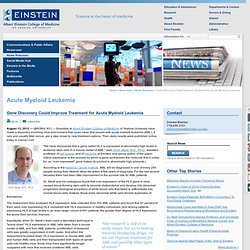
Their study results were published online today in Cancer Cell. Ulrich Steidl, M.D., Ph.D. " Antidepressant shows promise as cancer treatment. An antidepressant combined with a drug derived from vitamin A could be used to treat a common adult form of leukemia, according to laboratory research led by a team at The Institute of Cancer Research (ICR).
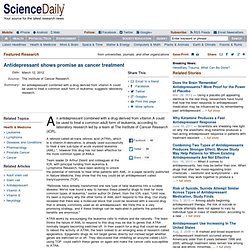
A retinoid called all-trans retinoic acid (ATRA), which is a vitamin A-derivative, is already used successfully to treat a rare sub-type of acute myeloid leukemia (AML) *, however this drug has not been effective for the more common types of AMLs. Team leader Dr Arthur Zelent and colleagues at the ICR, with principal funding from leukemia & Lymphoma Research, have been working to unlock the potential of retinoids to treat other patients with AML. First comprehensive DNA study of mast cell leukemia uncovers clues that could improve therapy. Sequencing a cancer patient’s “exome” reveals mutations critical for improving diagnostic power and targeted therapy Cold Spring Harbor, N.Y. – Cancer researchers at Cold Spring Harbor Laboratory (CSHL) have carried out the first comprehensive study of the changes seen in the DNA of a patient with mast cell leukemia (MCL), an extremely aggressive subtype of acute myeloid leukemia (AML) with a very poor prognosis.
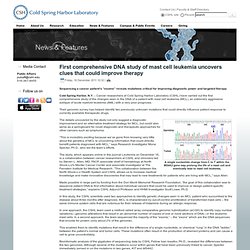
Their genomic survey has helped identify two previously unknown mutations that could directly influence patient response to currently available therapeutic drugs. A single nucleotide change from C to T within the MS4A2 gene may prolong the life of a mast cell and eventually lead to mast cell leukemia.The details uncovered by the study not only suggest a diagnostic improvement and an alternative treatment strategy for MCL, but could also serve as a springboard for novel diagnostic and therapeutic approaches for other cancers such as lymphoma.
Key genetic error found in family of blood cancers. Scientists have uncovered a critical genetic mutation in some patients with myelodysplastic syndromes — a group of blood cancers that can progress to a fatal form of leukemia.
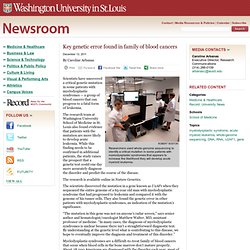
The research team at Washington University School of Medicine in St. Louis also found evidence that patients with the mutation are more likely to develop acute leukemia. While this finding needs to be confirmed in additional patients, the study raises the prospect that a genetic test could one day more accurately diagnose the disorder and predict the course of the disease. The research is available online in Nature Genetics. The scientists discovered the mutation in a gene known as U2AF1 when they sequenced the entire genome of a 65-year old man with myelodysplastic syndrome that had progressed to leukemia and compared it with the genome of his tumor cells. Myelodysplastic syndromes are a difficult-to-treat family of blood cancers that occur when blood cells in the bone marrow don’t mature properly.
Gene Mutation Signals A High Risk Of Recurrence In Some Older Acute-Leukemia Patients. COLUMBUS, Ohio – Older people with acute myeloid leukemia and normal looking chromosomes in their cancer cells have a higher risk of recurrence if they have mutations in a gene called ASXL1, according to a new study by researchers at the Ohio State University Comprehensive Cancer Center – Arthur G.
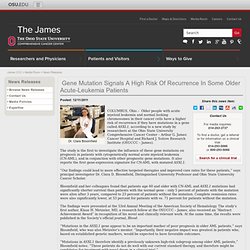
James Cancer Hospital and Richard J. Solove Research Institute (OSUCCC – James). The study is the first to investigate the influence of these gene mutations on prognosis in patients with cytogenetically normal acute myeloid leukemia (CN-AML), and in conjunction with other prognostic gene mutations. It also reports the first gene-expression signature for CN-AML with mutated ASXL1. “Our findings could lead to more effective targeted therapies and improved cure rates for these patients,” says principal investigator Dr. The findings were presented at the 53rd Annual Meeting of the American Society of Hematology. Other researchers involved in this study were Heiko Becker, Kati Maharry, Michael D.
Aging stem cells may explain higher prevalence of leukemia, infections among elderly. Human stem cells aren't immune to the aging process, according to scientists at the Stanford University School of Medicine.

The researchers studied hematopoietic stem cells, which create the cells that comprise the blood and immune system. Understanding when and how these stem cells begin to falter as the years pass may explain why some diseases, such as acute myeloid leukemia, increase in prevalence with age, and also why elderly people tend to be more vulnerable to infections such as colds and the flu. "We know that immune system function seems to decline with increasing age," said Wendy Pang, MD. "This is the first study comparing the function and gene expression profiles of young and old purified, human hematopoietic stem cells, and it tells us that these clinical changes can be traced back to stem cell function.
" The study was published online Nov. 28 in the Proceedings of the National Academy of Sciences. Pang began the study to understand whether human HSCs aged like mouse HSCs. Acute myeloid leukemia. The symptoms of AML are caused by replacement of normal bone marrow with leukemic cells, which causes a drop in red blood cells, platelets, and normal white blood cells.
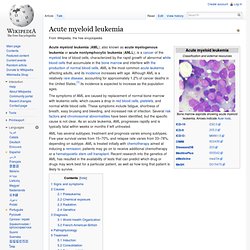
These symptoms include fatigue, shortness of breath, easy bruising and bleeding, and increased risk of infection. Several risk factors and chromosomal abnormalities have been identified, but the specific cause is not clear. As an acute leukemia, AML progresses rapidly and is typically fatal within weeks or months if left untreated.